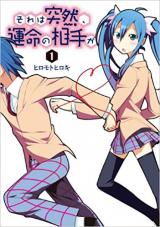For context, I only read the oneshot. I may read the rest some other time and revise my opinion.
The setting, wherein eugenics is proselytized by the State to its citizenry and its implications (genetic-based reproduction) are highly encouraged, to the point where society will both financially support our mains as they are such an ideal match, is reminiscent of other works classified as dystopian and usually cast in a negative light. This is especially so in the West where eugenics is primarily associated with Nazism and other nationalist movements.
The focus of this manga, however, is not truly that setting, rather the setting is a vehicle for the romantic plotline. Which, by its own merits, while not anything to write home about, was still enjoyable. However, the implication of setting a light-hearted romcom story in this setting, and using the eugenics system as a vehicle for romance, says much. I can see two potential interpretations. One, the idealization of genes as a end for romantic relationships. Yuuichi and Manami are seen using their ideal genetic compatibility as a means to justify their romantic relationship. Even if it is assumed that they do have in addition romantic compatibility, the conclusion is still that there is an overarching idea that achieving a genetic ideal in society is the ultimate end of their romantic relationship, that is, at least in part, how they get past their sibling relationship. While I am not going to comment on whether this is good socially or personally (this is hardly the place and I am hardly qualified), it is interesting to keep in mind that (while not as extensively adopted or pressed as in Nazi Germany) in Imperial Japan between before the end of World War II, efforts (legally and through propaganda) were made to limit the reproduction of those deemed genetically inferior while promoting reproduction of those deemed superior. Although there does not seem to be any direct ethnic ties to the form of genetic superiority promoted in this manga, the link still remains ominous.
Secondly, there is something this says about the manner in which a partner is chosen. Everyone is given a selected partner from the state, which they can refuse out of a sense of faux freedom-of-choice, in the same way in which any modern social norms can be freely disregarded, only after overcoming their internal predilection from their upbringing the with potentially heavy repercussions from their peers (even their father pressured them into accepting the State's recommendation). It is, of course, necessary to give this choice in order to avoid the full sense of a totalitarian regime. Yet the characters here are lured into a case of proxy Stockholm syndrome (the state pressures one into a romantic relationship from which a more authentic romantic interest is generated), which while not directly authoritative in law, seems to be authoritative in thought. The romcom veneer through which these stories are presented is further evidence of that, the sense of security through one expects from reading something lighthearted and fun parallels the sense of security and ease that the characters receive from following the system's societal norms (agreeing to the partner recommendation).
I will not say that my claims were necessarily considered by the author before writing, in fact I doubt it. It is interesting to me from the perspective of an insight into the modern Japanese mindset towards eugenics and the potential remnant ideologies present in modern Japan from the Showa period.





